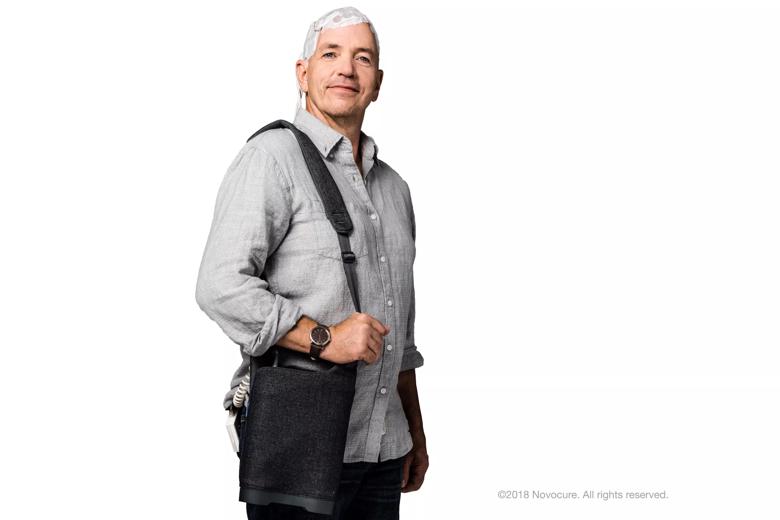First new medical intervention in a decade to demonstrate improved survival
Final results of a large multicenter trial show that adding a novel treatment modality — known as tumor-treating fields (TTFields [OptuneTM]) — to standard maintenance temozolomide therapy for glioblastoma extends median overall survival by more than 25 percent and time to progression by more than 50 percent compared with temozolomide alone. The study was published in the Dec. 19, 2017, issue of JAMA.
Advertisement
Cleveland Clinic is a non-profit academic medical center. Advertising on our site helps support our mission. We do not endorse non-Cleveland Clinic products or services. Policy

Photo of a patient wearing the Optune TTFields device (courtesy Novocure).
TTFields, consisting of low-intensity alternating electric fields, are delivered to the brain via surface transducer arrays adhered to the patient’s shaved head for at least 18 hours a day. The arrays are connected to a portable battery pack that weighs about three pounds, is the size of a large book and can be carried in a backpack. The intermediate-frequency (200 kHz) electric field that’s delivered interferes with mitosis during cell division, selectively targeting the rapidly dividing glioblastoma cells over normal brain tissue (see previous ConsultQD post for details).
“This is an exciting new intervention with limited side effects observed beyond local skin irritation,” says study co-author Manmeet Ahluwalia, MD, Director of the Brain Metastasis Research Program and Head of Operations in Cleveland Clinic’s Rose Ella Burkhardt Brain Tumor and Neuro-Oncology Center. “Other than temozolomide, no medical therapy until now has demonstrated a survival benefit in glioblastoma.”
The open-label trial randomized 695 patients with glioblastoma in a 2:1 ratio to either TTFields plus maintenance temozolomide therapy (n = 466) or temozolomide alone (n = 229). All patients had previously undergone tumor resection or biopsy and completed concomitant radiochemotherapy. Median time from diagnosis to randomization was 3.8 months.
Median progression-free survival from randomization was 6.7 months for patients receiving TTFields plus temozolomide versus 4.0 months for those receiving temozolomide alone (hazard ratio [HR] = 0.63; 95% CI, 0.52-0.76; P < .001). Median overall survival was 20.9 months versus 16.0 months , respectively (HR = 0.63; 95% CI, 0.53-0.76; P < .001). In addition, times to decline in cognitive measures (Mini-Mental Status Examination and Karnofsky performance score) were significantly longer in the combined-treatment group.
Advertisement
Results were consistent with the study’s interim analysis published in December 2015, which was detailed in a prior ConsultQD post. Randomization of the trial ended early after release of the interim analysis findings due to superior outcomes in the TTFields group. At that point, patients in the control arm were offered TTFields treatment and many crossed over to the combination therapy arm.
Patients were recruited from 83 sites in North America, Europe, Korea and Israel. According to Dr. Ahluwalia, Cleveland Clinic was one of the leading sites for patient accrual, with more than 20 study participants.
The FDA first approved the TTFields device in 2011 for treatment of glioblastoma that recurred or progressed after chemotherapy on the basis of a clinical trial that showed performance equal to that of commonly used chemotherapy without serious side effects. In 2015, based on preliminary findings of this current study, the FDA expanded the indication to include use in combination with temozolomide for patients with newly diagnosed glioblastoma following surgery and radiochemotherapy.
TTFields therapy is not associated with systemic side effects common to standard cancer therapies, such as nausea, vomiting, fatigue and reduced blood counts. Observed side effects are local and generally not severe: Over half of patients in this study experienced mild to moderate skin toxicity associated with the transducer arrays, with 2 percent experiencing severe skin involvement.
Dr. Ahluwalia says that the biggest inconvenience to most patients was having to shave their head every two to three days to ensure optimal electric field delivery. To derive benefit, patients need to wear the device 18 hours or more daily.
Advertisement
The JAMA study report notes that of more than 23 randomized trials conducted over the past decade evaluating new therapies or strategies for newly diagnosed glioblastoma, all but this one have failed to demonstrate improved survival. “Novel strategies for aggressive cancers such as glioblastoma are desperately needed,” Dr. Ahluwalia observes. “Tumor-treating fields offers an important contribution to our toolbox for fighting this disease.”
He adds that TTFields therapy is now being tested for use against ovarian, lung and pancreatic cancers.
Advertisement
Advertisement

First-of-its-kind research investigates the viability of standard screening to reduce the burden of late-stage cancer diagnoses

Global R&D efforts expanding first-line and relapse therapy options for patients

Study demonstrates ability to reduce patients’ reliance on phlebotomies to stabilize hematocrit levels

A case study on the value of access to novel therapies through clinical trials

Findings highlight an association between obesity and an increased incidence of moderate-severe disease

Cleveland Clinic Cancer Institute takes multi-faceted approach to increasing clinical trial access 23456

Key learnings from DESTINY trials

Overall survival in patients treated since 2008 is nearly 20% higher than in earlier patients